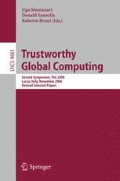Abstract
We propose a framework in which anonymity protocols are interpreted as particular kinds of channels, and the degree of anonymity provided by the protocol as the converse of the channel’s capacity. We also investigate how the adversary can test the system to try to infer the user’s identity, and we study how his probability of success depends on the characteristics of the channel. We then illustrate how various notions of anonymity can be expressed in this framework, and show the relation with some definitions of probabilistic anonymity in literature.
This work has been partially supported by the INRIA DREI Équipe Associée PRINTEMPS. The work of Konstantinos Chatzikokolakis and Catuscia Palamidessi has been also supported by the INRIA ARC project ProNoBiS.
Access this chapter
Tax calculation will be finalised at checkout
Purchases are for personal use only
Preview
Unable to display preview. Download preview PDF.
References
Chaum, D.: The dining cryptographers problem: Unconditional sender and recipient untraceability. Journal of Cryptology 1, 65–75 (1988)
Halpern, J.Y., O’Neill, K.R.: Anonymity and information hiding in multiagent systems. Journal of Computer Security 13, 483–512 (2005)
Bhargava, M., Palamidessi, C.: Probabilistic anonymity. In: Abadi, M., de Alfaro, L. (eds.) CONCUR 2005. LNCS, vol. 3653, pp. 171–185. Springer, Heidelberg (2005), http://www.lix.polytechnique.fr/~catuscia/papers/Anonymity/concur.pdf
Reiter, M.K., Rubin, A.D.: Crowds: anonymity for Web transactions. ACM Transactions on Information and System Security 1, 66–92 (1998)
Chatzikokolakis, K., Palamidessi, C.: Probable innocence revisited. Theoretical Computer Science 367, 123–138 (2006), http://www.lix.polytechnique.fr/~catuscia/papers/Anonymity/reportPI.pdf
Serjantov, A., Danezis, G.: Towards an information theoretic metric for anonymity. In: Dingledine, R., Syverson, P.F. (eds.) PET 2002. LNCS, vol. 2482, pp. 41–53. Springer, Heidelberg (2003)
Díaz, C., Seys, S., Claessens, J., Preneel, B.: Towards measuring anonymity. In: Dingledine, R., Syverson, P.F. (eds.) PET 2002. LNCS, vol. 2482, pp. 54–68. Springer, Heidelberg (2003)
Moskowitz, I.S., Newman, R.E., Crepeau, D.P., Miller, A.R.: Covert channels and anonymizing networks. In: Jajodia, S., Samarati, P., Syverson, P.F. (eds.) WPES, pp. 79–88. ACM, New York (2003)
Moskowitz, I.S., Newman, R.E., Syverson, P.F.: Quasi-anonymous channels. In: IASTED CNIS, pp. 126–131 (2003)
Deng, Y., Pang, J., Wu, P.: Measuring anonymity with relative entropy. In: Proceedings of the 4th International Workshop on Formal Aspects in Security and Trust. LNCS, Springer, Heidelberg (to appear, 2006)
McLean, J.: Security models and information flow. IEEE Symposium on Security and Privacy, 180–189 (1990)
Gray III, J.W.: Toward a mathematical foundation for information flow security. In: Proceedings of the 1991 IEEE Computer Society Symposium on Research in Security and Privacy SSP 1991, Washington - Brussels - Tokyo, pp. 21–35. IEEE, Los Alamitos (1991)
Clark, D., Hunt, S., Malacaria, P.: Quantitative analysis of the leakage of confidential data. In: Proc. of QAPL 2001. Electr. Notes Theor. Comput. Sci, vol. 59 (3), pp. 238–251. Elsevier Science B.V., Amsterdam (2001)
Clark, D., Hunt, S., Malacaria, P.: Quantified interference for a while language. In: Proc. of QAPL 2004. Electr. Notes Theor. Comput. Sci, vol. 112, pp. 149–166. Elsevier Science B.V., Amsterdam (2005)
Lowe, G.: Quantifying information flow. In: Proc. of CSFW 2002, pp. 18–31. IEEE Computer Society Press, Los Alamitos (2002)
Maurer, U.M.: Authentication theory and hypothesis testing. IEEE Transactions on Information Theory 46, 1350–1356 (2000)
Pierro, A.D., Hankin, C., Wiklicky, H.: Approximate non-interference. Journal of Computer Security 12, 37–82 (2004)
Pierro, A.D., Hankin, C., Wiklicky, H.: Measuring the confinement of probabilistic systems. Theoretical Computer Science 340, 3–56 (2005)
Cover, T.M., Thomas, J.A.: Elements of Information Theory. John Wiley & Sons, Inc, Chichester (1991)
Sabelfeld, A., Sands, D.: Probabilistic noninterference for multi-threaded programs. In: Proc. of CSFW 2000, pp. 200–214. IEEE Computer Society Press, Los Alamitos (2000)
Deng, Y., Palamidessi, C., Pang, J.: Weak probabilistic anonymity. In: Proc. of SecCo 2005. Electronic Notes in Theoretical Computer Science, Elsevier Science Publishers, Amsterdam (2005), http://www.lix.polytechnique.fr/~catuscia/papers/Anonymity/report_wa.pdf
Author information
Authors and Affiliations
Editor information
Rights and permissions
Copyright information
© 2007 Springer-Verlag Berlin Heidelberg
About this paper
Cite this paper
Chatzikokolakis, K., Palamidessi, C., Panangaden, P. (2007). Anonymity Protocols as Noisy Channels. In: Montanari, U., Sannella, D., Bruni, R. (eds) Trustworthy Global Computing. TGC 2006. Lecture Notes in Computer Science, vol 4661. Springer, Berlin, Heidelberg. https://doi.org/10.1007/978-3-540-75336-0_18
Download citation
DOI: https://doi.org/10.1007/978-3-540-75336-0_18
Publisher Name: Springer, Berlin, Heidelberg
Print ISBN: 978-3-540-75333-9
Online ISBN: 978-3-540-75336-0
eBook Packages: Computer ScienceComputer Science (R0)

